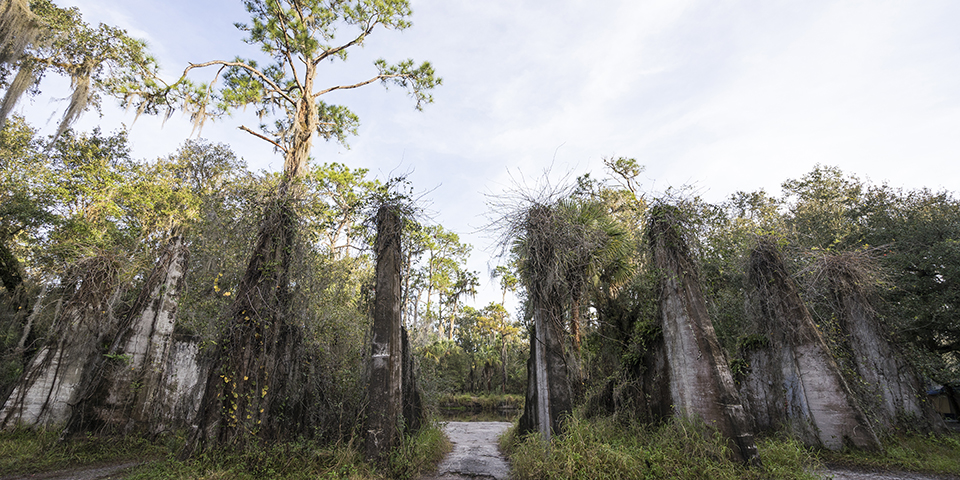FLORIDA
Tour these rivers, fishing grounds and lesser-known cultural spots to get new insights into Florida. See a rodeo in the heart of southern Florida and reel in tarpon in the Gulf.
Arcadia
Situated deep in the heart of Florida’s cowboy country, this slow-rolling town is known for its long history of cattle-raising, rodeos, county fairs and more. Combining the ruggedness of the Old West with the easy-going charm of the Old South, it’s easy to experience the best of that storied history at the annual Rodeo fest or by simply exploring the quaint downtown. Outdoors adventurers have plenty to enjoy as well, with scenic rivers, wildlife and fishing galore all within reach. Explore a part of Florida that often gets overlooked.
Canoeing on the Peace River
At 106 miles long, the Peace River is one of Florida’s most important waterways. It’s also one of the most fascinating. Fossil hunters have been coming here for years to unearth the plentiful shark’s teeth and prehistoric bones throughout the area and you can join them on a guided canoe tour that includes wildlife viewing, swimming, fossil hunting and more. Canoe Outpost has been running trips for over 50 years and has earned its place as one of the state’s premier outfitters. Of course, you can forego the fossils and just enjoy a leisurely paddle among the marshes.
Lions, Tigers & Bears Wildlife Sanctuary
This nonprofit is a must-visit for animal lovers with a taste for the exotic. Founded in 1998, the 40-acre, wildlife refuge acts as a sanctuary to animals including black bear, white-tailed deer, cougars, tigers and lions that were kept by private owners and are unable to survive in the wild. Focusing on educating a new generation about the impact of owning exotic pets, the refuge is a small, but family-friendly operation with a big heart.
Arcadia Fall Rodeo in October
The spirit and determination of the “Florida Crackers,” called that for the sound of their whips, is on full display each fall at Arcadia’s renowned Fall Rodeo. Part of the professional rodeo circuit, the championship event puts winners on track to ride at the National finals in Las Vegas, so expect to see the best of the best give it their all. Activities surrounding the event are numerous with junior competitions, faux shootouts, food, music and more.
Regional Recipe
Fruit Salad Bowl
With Florida’s unique climate, visitors can choose from an array of fruit, including bananas, citrus, figs, mangos, papayas and peaches. Recipe adapted from Woodall’s Campsite Cookbook.
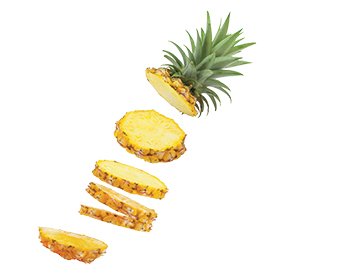
getty images
Fruit Ingredients:
- 1 melon
- 2 pears
- 4 peaches
- 4 slices of pineapple
- 2 bananas
- Really Good Dressing
Other Ingredients
- 2 tbsp sugar
- 1 tsp dry mustard
- 1 tsp paprika
- ¼ tsp salt
- 5 tbsp vinegar
- 1 tbsp lemon juice
- 1 tsp grated onion
- ¼ tsp Worcestershire sauce
- 1 cup salad oil
Directions:
Peel and cut melon into wedges.
Peel and core pears and peaches; cut into chunks.
Cut pineapple into bite-sized pieces; peel and slice bananas.
Combine all ingredients in large bowl.
In a separate bowl, combine Really Good Dressing Ingredients except for the salad oil and blend well. Add salad oil and blend again.
Serve salad with dressing or any fruit dressing. Serves 6.
Antiquing Downtown
With so much to see and do it’s hard to imagine setting aside a day to wander the shops on unassuming Oak St., but if you’re looking for the steal of a lifetime, Arcadia boasts one of the finest antique shopping districts in the state. With eleven shops within a few blocks and frequent weekend markets and seasonal fairs, it’s hard not to be drawn in by the historic artifacts, artisanal crafts and quirky trinkets that line the tables and shelves of these one-of-a-kind markets. Acquire a piece of Florida history.
Brownville Park
Don’t skip on visiting plaintive Brownville Park, a quiet, 75-acre green space that features nature trails, fishing and easy access to the Peace River. With a convenient boat ramp to launch your kayak, canoe or boat, you can spend the day paddling north past the ancient floodplain forest of old oak, hemlock and sweet gum trees, before floating back on the tranquil current. Keep an eye out for the solumn owls that call the riverbank home, as well the many migratory birds that stop at this location year after year.
Myakka River State Park
About 30 miles due west, this sprawling 58 square-mile park doubles down on the outdoor activities available closer to Arcadia. Kayaking, canoeing, fishing and boating are all popular past times, as are hiking and biking the miles of back roads and trails that cut through the untouched wilderness. One of the state’s oldest protected parks, you won’t find better preserved wetlands, prairies and pine forests anywhere in central Florida. For a special treat, join a flat-bottomed boat tour around the endlessly scenic Upper Myakka Lake – just don’t forget your camera! The unique landscape is brimming with native flora and fauna you won’t find anywhere else.
Golf, Florida Style
Mild winters and tolerable summers mean ample time on the golf course. Sunnybreeze Golf Course in Arcadia is a nine-hole course replete with tree-lined fairways that stretch across lush landscapes. The Peace River runs adjacent to the par-35 course, which takes advantage of the terrain and offers guests frequent wildlife sightings.
Juicy Seafood
Savor the local delicacies in a tropical setting at the Nav-A-Gator Grill and Marina in Arcadia. Overlooking Deep Creek, which branches off the Peace River, this fish camp-style spot is popular with boaters and campers. The popular eatery serves up grilled grouper or fried gator tails accompanied by lively entertainment. The cover charge usually goes to school supplies or perishable food.
Crystal River
Located just 80 miles north of Tampa, this inland maze of springs, lakes and mangroves make for a one-of-a-kind environment and equally unique adventures. Whether it’s swimming in the picturesque, sparkling blue springs that flow at a cool 72 degrees year round, or getting up close and personal with one of the area’s wintering manatees, you’ll quickly discover why this vacation destination is known as the “Gem of the Nature Coast.”
Three Sisters Springs
If seeing a manatee (or two or three) is on your agenda, don’t miss Three Sisters Springs, a natural inlet that hosts hundreds of unique animals each winter. Depending on the time of year, you can paddle, snorkel, or swim with these gentle giants in the clear, emerald water. Experts say the best time to take a dip with these gentle mammals is during the winter months, but ecotours and other excursions promising sightings of this fascinating mammal are offered year-round.
On the Boardwalk
If you chose to stay on land, enjoy the incredible views from the boardwalk that circles the manatee area. Birdwatchers won’t want to miss the restored wetlands that surround the springs and are home to dozens of unique bird varieties.
Homosassa Spring Wildlife State Park
Just south of Crystal River, this park boasts some of the most diverse wildlife you’ll see anywhere in the state. A section featuring captive animals unable to live in the wild includes alligators, black bears, red wolf, key deer, flamingoes and other species found naturally in the region. That is, except for “Lu,” the park’s beloved hippopotamus that was given Florida residency status instead of being removed. The paved trails are a great way to see these animals in the wild, especially for birdwatchers looking to check a few unique species off their list. In addition to what you’ll see along the trails, the Fish Bowl underwater observatory allows visitors a view of the fish and manatees that inhabit the spring throughout the year.
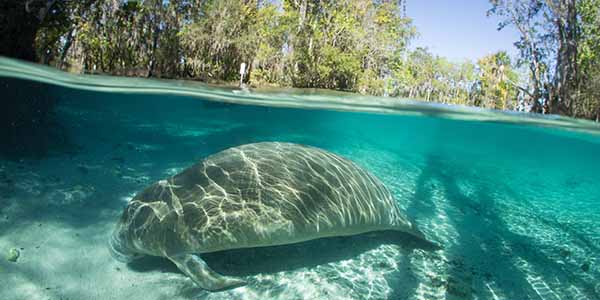
A Manatee in the Crystal River, Florida.
Crystal River Preserve State Park
Visiting Crystal River Preserve State Park is like taking a trip back in time, as much of the area has been left untouched for centuries.
Combining freshwater from spring-fed rivers and saltwater from the Gulf of Mexico, the park’s 27,500 acres are one of Florida’s most biologically diverse estuaries, including pinewoods, mangroves, salt marshes and hardwood forests to be explored by bike on the park’s seven-mile loop or by boat for a waterfront view. Lucky naturalists should keep an eye out for the resident otter families or a dolphin cruising the water for its next meal.
Town of Homosassa
In Homosassa, water is central to everyday life. The town was one of Florida’s original fishing villages and remains a top sport fishing destination as well as a working commercial fishing port on the Gulf of Mexico. It’s also world-renowned for the size of its tarpon, so anglers looking to reel in a trophy-size catch should consider booking a local charter to get the inside scoop on the area’s hot spots. And after a day on the water, there’s nothing better than stopping by one of the fresh fish markets for the catch of the day or visiting one of Florida’s most famous hole-in-the-wall seafood joints: the funky and fun Freezer Tiki Bar.
Try Kayaking Along the Crystal River
If you love the idea of adventure, kayaking the Crystal River with a planned route is the way to go. Kayak rentals are easy to find and there are guides to show you the routes, which range anywhere from a 10-minute journey to 10 miles or more. Try exploring Homosassa Springs, Three Sisters Springs or Kings Bay. Kayaking is also a way to get up close and personal with manatees.
History Unfolding
To step even further back into Florida living, visit the Crystal River Archaeological State Park, where pre-Columbian burial mounds and temple sites rise from the landscape. Interpretive walks and a museum at the visitors center are a great way to learn about Florida’s unique Native American history. Of particular interest is the 28-foot Native American mound that dates to 500 B.C. Set along extensive marshlands, the pre-Columbia center ranks as one of the longest continuously occupied sites in Florida; thousands of Native Americans visited the site over the course of 1,600 years. The site is also located on a marsh plain so bird-watchers will have a field day.
Perennial Plantation
It’s not just nature, though, that draws visitors to this year-round destination. The Plantation on Crystal River is a 232-acre eco-friendly resort that has been serving up locally sourced seafood, surf-and-turf and world-class golf for over 50 years.
Cool Croom
For terrain that is more challenging, the unpaved trails in the Croom area of the forest on the western side of the Withlacoochee River spice things up with hilly inclines and tricky technical areas in three loop trails over 19 miles. The Crystal River Preserve State Park preserves thousands of acres of coastline and is home to over half a dozen marked nature trails that snake through pinewoods, hardwood forests, salt marshes and mangrove islands, including a short boardwalk walking trail and a 7-mile unpaved biking/hiking loop trail.
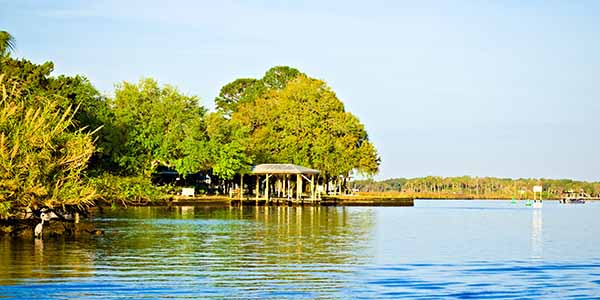
Landscape. Beautiful view by the Homosassa beach, spring water in the front view. Created in Homosassa, FL, 03/17/2020
Destin
Once home to a small fishing village, Destin has become one of Florida’s most popular vacation destinations. And with miles of white, sandy beaches and stunning emerald-green waters, it’s easy to see why. Located on the peninsula separating the Gulf of Mexico and Choctawhatchee Bay, it’s a haven for anglers, while serving up plenty of family fun, captivating nature parks and some of the best seafood around.
Fun on Choctawhatchee Bay
At a staggering 30 miles in length, Choctawhatchee Bay is full of bayous, creeks and rivers just begging to be explored. Thankfully, there’s no shortage of ways to get around. From jet skiing to kayaking, to paddleboarding, it’s easy to discover all that the Bay has to offer, but the most popular past time is fishing for salt and freshwater game fish like bass, trout, tarpons, flounder, and grouper. After a day on the water, take a breather at the foot of Destin’s East Pass Bridge, where boaters can relax on a submerged sandbar known locally as “Crab Island.” Don’t forget to bring your camera – the area is a favorite hangout for dolphins.
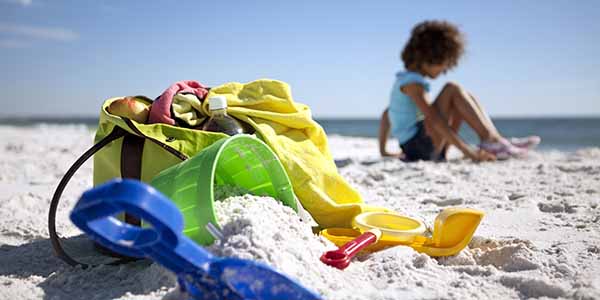
Beach bag, beach toys and a little girl on the beach.
Crystal Beach
A quaint neighborhood haven that includes the restaurant and boutique-filled Destin Commons, Crystal Beach is among the most beloved areas in Okaloosa County. Enjoy adorable pastel-colored beach cottages, long stretches of soft white sand and famed seafood restaurants, all while soaking up the sun just minutes from the warm Gulf waters. Evenings here are reserved for beachcombing and sunset views along the picture-perfect waters of the Emerald Coast. Nearby Henderson Beach State Park features over a mile of pristine sugar-white sand, as well as a ¾ long nature trail with local flora and endless opportunities for bird-watching.
HarborWalk Village
Of all the things there are to do in Destin, it’s hard to beat the over the top thrills of HarborWalk Village. Boasting weekly parades, world-class shopping, watersports rentals, and loads of live entertainment, there’s something for everyone at this waterfront mecca. Adventurers will want to head straight for the climbing wall or bungee jump, while nature lovers can try a dolphin cruise or sunset sail. Either way, finish your visit strolling one of the world’s most well-known marinas. There are hundreds of charter boats available for your every need, or simply keep an eye for the freshest catch of the day coming off the docks. Several restaurants in the village serve up eclectic fare for every taste.
Buccaneer Pirate Cruise
While at HarborWalk, don’t forget to book your trip aboard Destin’s premier pirate ship. Take to the seas for a family-friendly day filled with pirate-themed adventures such as water-gun battles, sword fighting, authentic cannon fires and a treasure hunt. Little ones will revel in pirate training and the chance to become part of the Buccaneer crew, but the two-hour cruise offers enough breathtaking scenery in the calm waters in and around the bay to keep adults excited too. Whether you’re young or just young at heart, there’s a reason why the Buccaneer Cruise is one of the city’s highest-rated attractions.
Charter Fishing
Nicknamed “The World’s Luckiest Fishing Village,” Destin is home to one of the most renowned charter boat fleets in the world. Over 250 outfitters are standing by to help you customize the trip of your dreams, from half- to full-day excursions or more depending on your needs, and there’s no fishing license or equipment required, so all you need to do is get ready to reel in the big one. Destin’s offshore waters are teeming with wildlife, so whether you’re an experienced angler looking to land a trophy-size marlin or a beginner hungry for your first catch, there’s no better place than the Emerald Coast. Charter operators will help instruct you on fishing fundamentals.

golf ball on tee with driver club at Florida course
Gulfarium
The Gulfarium Marine Adventure Park presents marine creatures in an interactive fashion. It’s hailed as a world-class marine science center. The Dolphin Splash Encounter is the Gulfarium’s signature experience. From a submerged platform, children age 8 and over (and adults) can touch, learn about and play with Atlantic bottlenose dolphins alongside a Gulfarium trainer.
Deer Lake State Park
Tucked away along county Road 30A, just west of WaterSound, this under-the-radar state park, which spans approximately 2,000 acres, offers budding naturalists the chance to learn about intact ancient sand dunes. These are rare ecosystems; in the United States, they only occur along the Gulf Coast. A mile-long elevated walkway guides visitors to new discoveries and habitats.
Fort Myers
Situated on a small barrier island measuring about seven miles in length, Fort Myers is a beautiful beach community and a popular vacation spot, especially in the winter. It’s celebrated by locals and visitors alike for its beautiful sands, historic city center, and proximity to all sorts of areas of natural beauty.
Fort Myers Beach and Pier
It should come as little surprise that Fort Myers’ biggest draw is its beach, a gorgeous stretch of white, so-called “sugar sand” that slopes gently down into turquoise waters. It’s a popular place for sunbathing, kayaking, and parasailing, though plenty of visitors prefer to just stretch out on the sand or go for a sunset stroll. Fishing is also incredibly popular, particularly off the 560-foot-long Fort Myers Beach Pier, where you can rent a rod from a local supplier and fish license free.
Times Square
In the heart of Fort Myers Beach, Times Square is the de facto city center, home to numerous little restaurants, bars, and shops (including plenty of spots to pick up souvenirs). It’s usually fairly lively day and night, with lots of outdoor seating and plenty of street performers. Bands often perform here starting around sunset on Friday and Saturday evenings, particularly during the busy season.
Edison & Ford Winter Estates
Spread out over 21 acres, this estate combines the winter homes of Thomas Edison and Henry Ford along with botanical gardens, a museum, and a botanical research lab. A visit here will give you plenty of insight into the lives of their famous owners and their contributions to society. Events for children and adults take place throughout the year, and guided tours are available, though visitors are free to explore on their own.
Fort Myers River District
Downtown Fort Myer’s, the River District is the most historic part of town, with much of the architecture here dating to the first part of the 20th century. This charming downtown area is home to all sorts of bars and restaurants, plus historical attractions such as the Georgian-revival Burroughs Home and Gardens. Just be aware that parking here can get tricky, so consider taking the vintage-style trolley or the free beach tram.
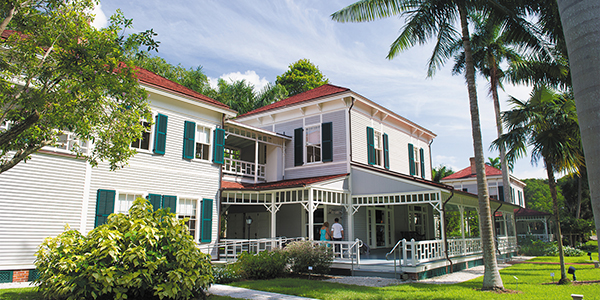
Located in Fort Myers, the Edison and Ford Winter Estates shed light on a pair of American innovators.
J.N. Ding Darling National Wildlife Refuge
Situated on the barrier island of Sanibel in the Gulf of Mexico, this refuge is a fantastic place for birding, with more than 6,400 acres of mangrove, marsh and hardwood hammock, 2,800 acres of which are a Federal Wilderness Area. Features include a visitor center with educational exhibits, bathrooms and a gift shop. There’s also a tram, complete with guided tours lead by a naturalist. Leashed dogs are welcome on designated trails.
Lovers Key State Park
Accessible only by boat, this beautiful stretch of barrier islands was originally slated for condominium development but was ultimately donated to the state to be transformed into a state park. There are tons to do here, including cycling trails (and bike rentals), kayaking in the estuary, fishing, hiking and — of course — swimming and sunbathing. The Welcome and Discovery Center features an exhibit hall and outdoor areas, including picnic spots.
Six Mile Cypress Slough Preserve
Spanning over 3,500 acres, this preserve features large expanses of cypress and wetlands and is home to all sorts of animals and birds. You may end up spotting alligators, turtles, and even otters here. It’s also a great spot for birding, with many migrating birds showing up here in the winter months. The best way to explore the slough is by taking a walk along the boardwalk; guided walks are also available throughout much of the year.
Spring Training Boston Red Sox and Minnesota Twins
Visit Fort Myers in the month of March and you’ll get the chance to experience the Boston Red Socks and Minnesota Twins spring training. During this time, baseball games take place pretty much every day. Minnesota Twins play at Hammond Stadium and the Red Sox play at JetBlue Park. College baseball teams also play at the parks, and regular baseball camps for kids take place here during the summer months.
Venice, Florida
About an hour’s drive up the coast, sits Venice, Florida, known as the world capital of sharks’ teeth due to the abundance of fossilized teeth that wash up here. A great spot for day trips from Fort Myers, Venice is home to 14 miles of sandy beach and boasts a charming, planned city center with Italianate architecture that’s on the National Register of Historic Places. There’s also a dog beach here, a rarity in Florida.
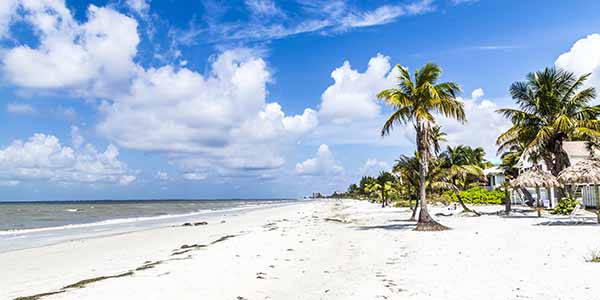
Beautiful beach at Fort Myers in America
Head to the Beach
You can’t visit Fort Myers — or any coastal Florida town, for that matter — without spending at least one day on a beach. The beaches here are some of the most pristine along the warm Gulf Coast; preservation of the delicate ecosystem is a top priority here, but Fort Myers Beach is open to a plethora of people-pleasing activities. Fort Myers even has its own Times Square, a lively retail destination with nightly entertainment, shopping and dining located at the end of Fort Myers Beach Fishing Pier. If you need to grab a few extra supplies upon arrival, there’s even a conveniently located Camping World in Fort Myers.
Estero
A bridge connects the mainland to Estero Island and its white beaches, and access to water that’s ideal for boating, sailing and fishing. Eco excursions on Estero Bay detail the rich marine life around Fort Myers, which is home to dolphins, seabirds and more. The Ostego Bay Marine Science Center educates visitors and residents about the marine ecosystem through hands-on exhibits and a working waterfront tour that highlights the city’s commercial shrimping industry.
First Floridians
See how ancient inhabitants lived on a guided tour of the Mound House on Estero Island. The 2,000-year-old structure is a Calusa Indian shell mound that’s preserved underground beneath the William H. Case estate, which itself is considered the oldest standing structure on the island. Now a museum, the Case house serves as a museum and learning center.
Manatee Park
Manatee Park on Palm Beach Boulevard is the place to spot the much-loved sea cows. Visitors can watch the creatures swim from three observation decks. The gentle creatures congregate in the river when the Gulf waters slip below 68 degrees in November and don’t rise again until March.
Imaginarium
Take advantage of the family-friendly Fort Myers ethos. The Imaginarium Science Center is an innovative blend of hands-on museum discoveries and live creatures cavorting in aquariums and an outdoor lagoon. Even Edison would envy the Discovery Lab exploration station.
Hendry County
In Hendry County, sprawling patches of pristine wetlands and bass-filled waterways give you a front-row seat to South Florida’s wild side. Whether you choose to take an airboat ride through the Everglades, cast a line in Lake Okeechobee or traverse miles upon miles of forest trails, you’ll find an infinite amount of ways to explore this untamed part of the Sunshine State.
Swamp Safari
Located within the Big Cypress Reservation, the Billie Swamp Safari offers a range of activities guaranteed to get your heart pumping. Watch a snake demonstration, whiz across the Everglades by airboat or board the swamp buggy safari to come face-to-face with alligators, hogs and maybe even a Florida panther. Riding on large tractor wheels, swamp buggies can handle almost any terrain, giving you an amazing ride. Be sure to try the tasty Seminole fry bread at the Swamp Water Café too. If you’d like to stay the night, reserve one of the traditional chickees in the park. The rustic thatched-roof dwellings may be simple, but they give you the chance to hear the wetlands come alive after the sun goes down.
Fantastic Freshwater Fishing
Lake Okeechobee is one of the nation’s top destinations for largemouth bass. If you’re ready to reel in a big one, head to Roland and Mary Ann Martin Marina on the west side of the lake. The resort and marina have everything you need for your angling adventure, including a tackle shop, boat rentals, fishing guides and more. Uncle Joe’s Fish Camp at Liberty Point is another great location to launch your boat from. Spend the day catching bass and then stay overnight at a campsite or air-conditioned cabin. For more angling action, make your way to the Caloosahatchee River. Beginning at Lake Okeechobee and running through LaBelle, this 67-mile-long river is a hotspot for trout, bass, tarpon and catfish. Discover the river’s most bountiful spots.
Florida Untamed
Swaths of dense forest remain untouched in this part of the Sunshine State. If you’re set on getting away from it all, go to the 32,370-acre Okaloacoochee Slough State Forest where loads of hiking and biking trails await. The Spirit-of-the-Wild Wildlife Management Area is also an excellent place for wildlife viewing with opportunities to see sandhill cranes, white-tailed deer and a variety of wading birds. Hunting can be done in both places, as well as in private estates like Black Boar Ranch, Big “O” Hunts and Gator Glades Hunts.
Sweet towns
Resting on the southern shores of Lake Okeechobee is Clewiston, the largest city in Hendry County. You can get a sense of the town’s Old South roots at the historic Clewiston Inn. Listed on the National Register of Historic Places, this 57-room hotel looks just like it did when it was built in 1926. Don’t miss the spectacular wildlife mural wrapping around the inn’s Everglades Lounge. More local history is on display at the Clewiston Museum. Step inside to view fossils discovered in Hendry County, original tools used in sugar cane production and Native American artifacts.
LaBelle
Beautiful LaBelle is just a stone’s throw away. Nestled along the banks of the Caloosahatchee River, this quaint community has a lovely commercial district lined with restaurants and shops. Pop in the Harold P. Curtis Honey Company for beeswax candles and all sorts of honey products and check out the art gallery and gift shop in Barron Park just a few blocks away.
Southern Celebrations
Get to know the community by attending local fairs and festivals throughout the year. The Hendry County Fair and Livestock Show takes place mid-February in Clewiston and draws quite the crowd with its youth livestock shows, carnival rides, beauty pageants and parade. In the same month is LeBelle’s Swamp Cabbage Festival. The two-day event promises family fun with a car show, rodeo, fishing tournament and 5K run. Live entertainment in Barron Park rounds out the experience. Got a sweet tooth? Fill up on all kinds of treats at the Clewiston Sugar Festival. Dating back to the 1930s, this March festival originally marked the end of the sugarcane harvest season and has evolved into the largest event in Hendry County.
The land of the unconquered
The Big Cypress Reservation is home to the Seminole clan, the only Native American tribe that has never been conquered by the United States government. You can hear their stories at the Smithsonian-affiliated Ah-Tah-Thi-Ki Museum. Exhibits, films and a research center touch on many topics like how the Seminole hunted, traded and traveled. There is also a boardwalk weaving through tranquil woodlands and a small village where you can purchase beautiful crafts and beadwork from Seminole elders.
Levy County/Cedar Key
Leave the man-made attractions behind and prepare to experience Cedar Key and Levy County, aka the Nature Coast. In this part of the Sunshine State, swimming holes let you uncover underwater worlds and wildlife refuges place manatees, gators and bald eagles right in front of your face. Cypress swamps are also open for exploration and fresh seafood awaits after an exhilarating day spent outdoors.
Meet the Manatees
Fifteen minutes from Chiefland is one of Florida’s most popular state parks: Manatee Springs. There’s a good chance you’ll see West Indian manatees here during the colder months as they like to hang out in the spring’s warmer waters. The park has a boardwalk and crystal-clear water so you’ll have no problem spotting these gentle giants. Even if you miss the manatees, the park is still worth visiting all throughout the year for its 8.5 miles of nature trails. Less than a 30-minute drive away is Fanning Springs State Park. Spend some time strolling the boardwalk through serene cypress swamp. In the summer, you may even catch massive sturgeons leaping out of the water. Warm water, clear visibility and depths of up 21 feet provide the perfect conditions for scuba diving as well. Strap on a mask, dive in and get up close to largemouth bass, bluegill and musk turtles.
Let Loose on the Water
Sightseeing cruises open the doors to Cedar Key’s alluring tidal marsh eco-system. You can book a cruise with Tidewater Tours and choose from three routes: the island, coastal marsh or Suwannee River. Expert guides accompany every trip and will share their knowledge about the unique landscape while pointing out migratory birds and marine life. If you’re set on scalloping or fishing, opt for an excursion with Voyles Guide. A U.S. Coast Guard Master Captain runs the tours and knows the best spots for catching grouper, tarpon, cobia and amberjack.
Mother Nature Calls
Covering 53,587 acres, the Goethe State Forest takes up a hefty portion of southeastern Levy County. An extensive trail system winds through the entire forest which allows you to explore a vast array of natural environments ranging from mesic flatwoods to basin swamp. Wildlife is plentiful too so keep an eye out for woodpeckers, gopher tortoises and striped newts. More animals can be seen at two national wildlife refuges: Lower Suwannee and Cedar Keys. The Lower Suwannee is a haven for otters, turtles and alligators. It’s also prime hunting grounds for white-tailed deer. Over in Cedar Keys, look out for dolphins, eagle rays and white pelicans. Shore fishing is permitted in most months so feel free to bring your tackle box too.
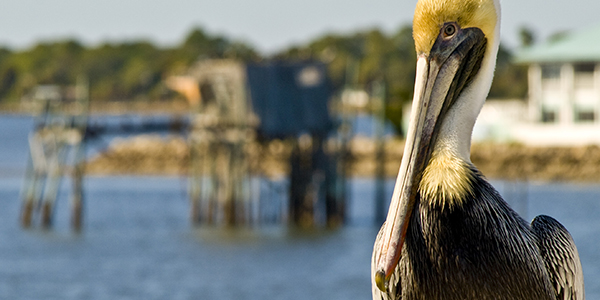
Cedar Key, Florida USA 02/01/2009: Pelican wildlife at Cedar Key on Florida’s Nature Coast.
Happy as a Clam
Cedar Key thrives on commercial clamming and you can see all the action at Southern Cross Sea Farms, one of the largest hard-shell clam producers in the state. Free tours walk you through the entire clam production process from the hatchery to the harvest. Fresh clams and fish are also available for purchase on-site. After the tour, head down the street to Tony’s Seafood. The clam chowder here has won the annual Great Clam Chowder Cook-Off in Rhode Island three times so you’ll definitely want to order a bowl or two. You can also pick up fresh, frozen or canned chowder if you want to bring some home. Keep in mind Tony’s chowder is also served in many restaurants all over Florida.
Community Events
There’s no shortage of family-friendly festivals in this section of Florida. Come to the Cedar Key Arts Festival in April to see ceramics, paintings, glasswork and more by over a hundred artists. The two-day event also hosts art demonstrations on both afternoons. In May, check out the Annual Garden Show and Spring Festival at Cedar Lakes Woods and Gardens. Musical performances, food trucks and plant vendors guarantee a fun day out. If you’re an environmentalist, sign up for September’s International Coastal Cleanup. The cleanup starts at the Cedar Key City Marina and ends with a hot dog lunch for volunteers. Don’t miss the Cedar Key Seafood Festival too. The two-day event in October is sure to satisfy your hunger with hearty bowls of chowder and fried oysters. A parade, live music and craft exhibits round out the experience.
The Heart of Old Florida
Cedar Key’s rustic marinas and retro diners keep the spirit of Old Florida alive. Get a feel for its old-timey atmosphere on Second Street, a commercial district lined with weathered buildings from the 1800s. Just a stone’s throw away is the Island Hotel and Restaurant, an 1859 establishment listed on the National Register of Historic Places. Stop for a drink inside the Neptune Bar and admire the beautiful murals which were painted in 1948. You can also unravel the town’s colorful past at two places: The Cedar Key Historical Museum and Cedar Key Museum State Park. Both museums chronicle the booms and busts of Cedar Key with photos, artifacts and more.
St. Lucie County
St Lucie County is blessed. The area’s 21 miles of uncrowded, pristine beaches are lapped by clear waters, and almost half this coastline is protected from development, a rarity in these parts. In addition to its beautiful setting and array of activities on land and sea, St. Lucie County offers a clutch of historic and cultural sites in revitalized Lincoln Park, Fort Pierce and St. Lucie Village.
Riding Free
With the Indian River Lagoon’s abundance of biodiversity and pristine beaches and dunes, St Lucie is a land of wild and scenic beauty. St. Lucie is famed among equestrians as one of the few places in Florida where riders can experience Florida’s wild beaches on horseback. On Hutchinson Island, Bathtub Beach draws families to its shallow reef, which provides rewarding snorkeling just 100 yards from the beach. On South Hutchinson Island, white sand Waveland Beach has all the requisite beach amenities for a fun and convenient daytrip. It’s the starting point for the 13.2-mile bike path that funnels north to Fort Pierce.
All Creatures Great and Small
The Fort Pierce City Marina is the launching pad for myriad on-the-water tours and activities. Wildlife watching tours on the Indian River Lagoon provide close encounters with over 4,000 native plants and animals, including manatees, sea turtles and bottlenose dolphins. This teeming 156-mile estuary is a magnet for anglers with prize-winning catches of tarpon, snook, red drum and huge sea trout. Novice surfers can take lessons through a local surf shop at Fort Pierce Inlet State Park, St. Lucie’s most consistent break.
Fishing for History
One of the oldest towns in eastern Florida, steeped in centuries-old fishing traditions, Fort Pierce remains a haven for seasoned anglers. With healthy waters populated with tuna, sailfish, barracuda, amberjack, cobia, snapper and grouper, records are constantly challenged and broken in these parts, including a colossal 17-pound, 7-ounce sea trout plucked from these waters in 1995.
Diamond Days
Baseball fans know that Florida becomes a hot spot for both fans and scouts during the spring months when major league teams head south for spring training. The New York Mets have called Port St. Lucie their springtime home for years, and there’s nothing quite like seeing the team play in the casual preseason atmosphere. You can also explore the historic downtown.
Golf Nirvana
The nearby PGA Village Golf Resort offers the chance to try your luck on the greens with a state-of-the-art training facility, multiple courses and a performance center where experts can help you improve your game. Learn about the rich heritage of golf or take your choice of three challenging 18-hole courses. Learn about famous golfers at the museum.
American Heroes
The area is also home to the world’s only museum dedicated to the fearless spirit of the naval warriors who trained in the area’s coastal waters. The National Navy UDT-SEAL Museum boasts displays on the exploits of the legendary fighters.
Tampa
A bustling city with an enviable setting on the Gulf Coast, Tampa keeps visitors busy with a slew of adventures. Few cities can lay claim to such world-class cultural attractions along with white-sand beaches, secluded bays, fertile rivers and state parks for travelers wild at heart.
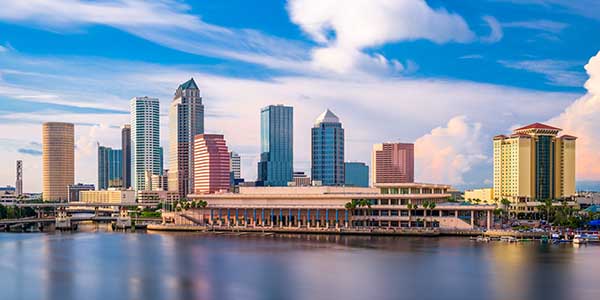
Tampa, Florida, USA downtown city skyline.
The Thrill of It
From the slick glass and steel towers of downtown to the boisterous bars and nightclubs at historic Ybor City and the upscale shopping along St. Petersburg’s Beach Drive, there’s never a dull moment in Tampa. Busch Gardens’ adrenaline-infused rides, the water-themed activities of Adventure Island, and the impressive displays at the Florida Aquarium will keep families entertained for days on end. Tampa’s acclaimed Museum of Art is a breathtaking repository of classical antiquities, decorative arts, 20th-century photography and modern art.
Art from the Surreal to Spectacular
At the Salvador Dali Museum in St Petersburg, visitors can peruse 2,400 of the outlandish Spaniard’s works, the largest collection of Dali’s works outside Europe. There’s plenty to satisfy art lovers at the John and Mable Ringing Museum of Art in Sarasota with its collection of circus bills and Asian art.
Cuba Libre
Founded by cigar manufacturers, Tampa’s Cuban influences infuse the city’s cultural landscape, especially in the city’s Latin Quarter, Ybor City. A National Historic Landmark District, Ybor City’s eye-catching brick buildings and former cigar factories have been recast as hip boutiques, chef-driven concept restaurants and contemporary galleries. The nightlife here is legendary, with a diverse mix of nightspots ranging from boisterous themed clubs to sophisticated wine bars, cocktail lounges and dive bars. Visitors can unravel the region’s Cuban roots at the Ybor City Museum State Park, where guided tours shed light on how the city became home to over 150 cigar factories and in the process (so legend has it) created the Cuban sandwich.
Beauty and the Beach
Within Tampa’s city limits, the Ben T. Davis Beach boasts swathes of powdery white sand, magnificent sunsets and calm, clear waters that are perfect for swimming. Clearwater Beach is renowned for its beauty and beach party ambience with high-end beach resorts that stand sentry over white sand beaches where there’s personal watercraft, parasailing, snorkeling and pirate ship cruises.
Chill on the Shore
For a more soulful experience, the protected mangrove-fringed beaches and turquoise waters of Caladesi Island State Park (only accessible by boat) deliver pure Gulf Coast magic without the crowds. A 3-mile paddling trail traverses the island’s mangroves and affords great wildlife watching.
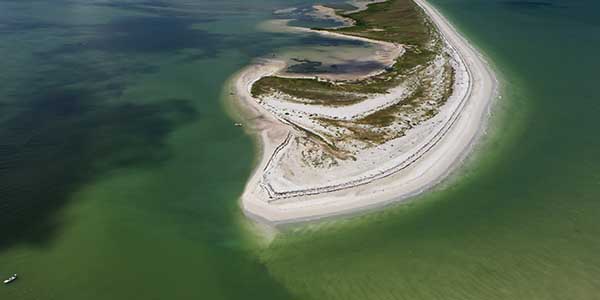
Honeymoon Island State Park is a Florida State Park located on Honeymoon Island, a barrier island across St. Joseph’s Sound from Palm Harbor, Ozona, and Crystal Beach. The park is 385 acres (1.6 km2) in land area with 2,400 acres (10 km2) submerged and 4 miles (6 km) of beach. Honeymoon Island was formerly known as Hog Island
Honeymoon Trails
Florida’s most-visited state park, Honeymoon Island is famed for its blissed-out beaches, abundant birdlife and the Osprey Trail that weaves through endangered pine forest. The island and its 4 miles of stunning beaches are best explored by bike, on foot or via kayak. The hardwood forests, pristine lakes and rolling hills of Alafia River State Park, 30 miles southeast of Tampa, are crisscrossed with a network of over 40 miles of trails. Little Manatee River State Park is the setting for one of Florida’s most popular hiking trails, a 6.5-mile loop trail through rare ecosystems.
Pirates of the Caribbean
Tampa boasts a robust lineup of festivals and events that celebrate the region’s history, cuisine and landscape. The Gasparilla Pirate Festival in late January has been celebrating buccaneers and their shenanigans since 1904. At the Gasparilla Festival of the Arts in early March, over 1,000 artists compete for 300 spots in a highly competitive juried art show that aims to recognize both established and emerging artists. The Tampa Riverfest festival features food and drink tastings, arts and craft exhibits, live music, and the magical hot air balloon glow event. In February, Florida’s State Fair delivers agricultural and artistic exhibits and carnival rides. In November, top jazz musicians from across the nation converge on Clearwater for the Suncoast Jazz Festival.
Mr. Ybor and Mr. Plant
The city’s historic Latin district, Ybor City came into being when Vicente Martinez-Ybor, a Cuban immigrant, arrived in 1886. Lured by an abundant water supply and superb transportation infrastructure, Ybor’s vision was to establish Tampa as the world’s cigar capital. When the Great Depression and mechanization hurt Tampa’s cigar industry in the late 1920s and early 1930s, Ybor City’s economic stature sharply declined. At the Ybor City Museum, housed in the 1920s-era Ferlita Bakery building, you can trace the history of Ybor City and immigrants’ role in the city’s commercial heyday. The museum’s exhibits include a typical “casita,” complete with period furniture as well as decorations.
Past on Display
At the Henry B. Plant Museum (formerly the Tampa Bay Hotel), you can marvel at a dazzling collection of antiques, artworks and period furnishings. Railroad mogul Henry B. Plant built the transport infrastructure necessary to attract and connect businesses and hotels. Plant’s lavish Tampa Bay Hotel, with its striking six silver minarets, was modeled on the Alhambra palace in Spain and now stands as a symbol of Tampa’s tourist industry.
Tampa Beauty
The Tampa Museum of Art and the Tampa Bay History Center are two other must-visits for art and history buffs, while those traveling with small children might want to pay a visit to the Glazer Children’s Museum. At the Tampa Museum of Art, a constantly changing set of collections are on display across a range of themed galleries. The museum’s permanent exhibits include six galleries of ancient Greek and Roman artifacts.
Thonotosassa: More Than a Name
After touring Tampa, take a side trip 15 miles northeast to Thonotosassa, a town with recreation menu as interesting as its name. Opportunities for outdoor play abound on the northern fringes of Thonotosassa in places like the Lower Hillsborough Wilderness Preserve and Hillsborough River State Park. Paddling on the unhurried waters of the Hillsborough River is a favorite pastime here, along with explorations along more than 60 miles of forest and cypress swamp trails. Fort Foster State Historic Site, located along the river, is one of two reconstructed Seminole War forts in Florida and is open for visitors. The rough-hewn wooden walls and buildings of this military outpost recreate the conditions that U.S. soldiers faced in 1836, when Seminoles laid siege to the fort and attempted to burn down the structure. The attackers were repelled by musket and cannon fire from the combatants defending the fort. The community is close to one of Florida’s biggest family-friendly tourist attractions. Dinosaur World in nearby Plant City boasts more than 200 life-size replicas of the “terrible lizards” that roamed the land.
For More Information
Arcadia: Discover DeSoto County Tourism Development Council
863-491-7574
www.visitdesoto.com
Discover Crystal River
800-587-6667
www.discovercrystalriverfl.com
Destin Visitors Bureau
800-322-3319
www.emeraldcoastfl.com
The Beaches of Fort Myers and Sanibel
800-237-6444
www.fortmyers-sanibel.com
Hendry County Tourist Development Council
863-983-7979
www.discoverhendrycounty.com
Levy County Visitors Bureau
877-387-5673
www.visitnaturecoast.com
St. Lucie County
800-344-8443
www.visitstlucie.com
Visit Tampa Bay
800-448-2672
www.visittampabay.com
